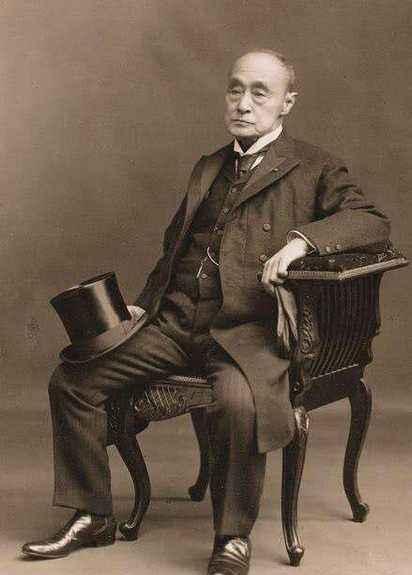On September 12, 1868, the enthronement ceremony of the new emperor will be held in Japan.
At this time, it has been almost 1 year and 8 months since the emperor collapsed.
Originally, the ceremony was supposed to take place in December 1867, but because the new government army and the Tokugawa shogunate had reached a stalemate, the war between the two sides was imminent and could not be completed.
By September, the situation had changed considerably, and the Edo shogunate established by Tokugawa Ieyasu, which had ruled Japan for more than two hundred years, was in turmoil amid the external troubles of the great powers and the internal troubles of the fall of the king.
Tokugawa Keiki had expressed his deference half a year earlier, and had avoided entering the temple, and the fifteenth generation of the Tokugawa shogunate, the great general of the Shogunate, became the king of the dead curtain.

(Tokugawa Keiki in his later years)
Although there are still remnants of the shogunate resisting, it is irrelevant to the overall situation.
Therefore, the enthronement ceremony was finally held.
At this time, the world had entered the modern era — of course, we now call them modern times, and call themselves contemporary — and the most influential in Japan were the Westerners.
Their science and trade, strong ships and sharp cannons, deeply attracted many Japanese, who wanted to get rid of the influence of the Central Plains Dynasty.
Emperor Meiji 1852-1912 states:
Iwakura asked Kamei, now a former daimyō of the Bureau of Divine Affairs, to consult the literature and rule on the norms of "imperial divine inheritance". Iwakura knows that most of the traditional etiquette in everyone's mind is actually copied from the Chinese model. He believed that in this era of restoration and change, it was very suitable for the revision of the ceremonial court, thus setting an example for the coronation ceremonies of future generations.
Eventually, they did make some changes:
First, the dress of Emperor Meiji is more like the official uniform of Shinto priests. "Abandoning the tradition of Tang dresses since the Middle Ages".
Second, although at the coronation ceremony, there were still people holding a kusanagi sword and eight-foot qiong goku jade—and another mirror was often offered to Ise Jingu—a new item was highlighted.
That was the globe that Tokugawa Kisaki gave to Emperor Daiyuki Takaaki.
Tokugawa Kisaki was the lord of Mito Domain and a scholar of Yangming Studies. Although somewhat conservative, dissatisfied with the signing of the U.S.-Japan contract and being punished many times, he refreshed the feudal government and established modern industry. From the fact that he sent a globe to Emperor Xiaoming, it can be seen that although he is xenophobic, he is not old-fashioned.
Another person in charge of the ceremony, Fukuha Mijing, believes that if the globe can become the focus, "it will revive the lofty aspirations of the hundred families present, deepen their understanding, and make ordinary people feel the solemnity of the coronation ceremony."
Third, when you say the people, the people will arrive. In the past, when the emperor ascended the throne, it was a small scope, and only senior secretaries of state could participate. Now, they want all the people to participate in the ceremony.
Although I want to come up with some new ideas, on the whole, it is still traditional.
First, a Yin-Yang master saw the day and said that September 12 was an auspicious day of the zodiac.
After that, the court sent people to the major shrines to worship and pray that there would be no rain or wind on the day.
(Itsukushima Shrine in the Meiji era)
At the same time, people were also sent to the tombs of Emperor Shenmu, Emperor Tenchi, and other ancestors to inform them that the ceremony was to be held.
Interestingly, as mentioned earlier, they hoped to get rid of the influence of the Central Plains Dynasty, but it was Emperor Tenchi who studied the Tang Dynasty and carried out a great reform that gave Japan its later appearance.
After ascending the throne, on October 31, he issued the era name, Meiji, which is also a profound Chinese classic," the I Ching:
The saints look south and listen to the world, and rule to the light.
(Emperor Meiji)
However, since then, it has been stipulated that the first emperor will use only one era name, which is different from the previous era name when a major event occurs.
Ideal Kingdom Translation Series 028 Meiji Emperor: 1852-1912 ¥118.5 Purchase
At noon, the coronation ceremony ended. Then the rain stopped, and the sky suddenly cleared.
It can be seen that their previous prayers did not play much role. It was still raining.
However, in the end, the sky cleared, and "everyone was very happy and saw this as an auspicious omen".
As the rural saying goes, the mouth has two skins.
There are also ways to say that it rains, there are also sunny days, and there are also --
You can make sense of what you say.